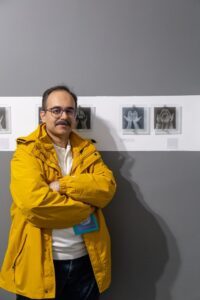 CinemaFarhad Khaledi Nick;
CinemaFarhad Khaledi Nick;
The series “Fariba” is close to its final episodes. The series directed by Mahmoud Moazami, who aired every night via the Third Channel of Sima, was the focus of some television audiences. Especially audiences who are interested in tracking the pages of influenza and bloggers on social media. The Fariba series is trying to make the audience more understanding of the tremendous impact of cyberspace on the private lives of different people in the community, and seems to have been successful.
The following is an interview with Javad Safavi, the author of Fariba, who says of his first screenwriting experiences:
Given that “Fariba” is the first work on the screenwriter, tell you first of all about your records in this field.
I have been seriously looking to get into the scriptwriting professional field since I attended the Shadmehr Rastin screenwriting classes. At the end of the year, after the formation of the Cinema Screenwriting Club as an active member of the club, I was present at specialized meetings, and during the meantime I was honored to get acquainted with Mr. Mohammad Reza Gohari of Iranian Cinema Screenwriting and in the same time. To gain experience with them, and I still consider themselves a student.
Has your work as a cinematic writer and critic helped you in screenwriting?
I have been actively in the field of notebooks and cinema criticism in the online space with Ahmad Shahvand Aziz, who was the founder of the country’s first cinematic site, the first cinematic site of the country, the first cinematic site of the country, the first cinema site of the country called “C Net”. In the following years, I collaborated with the newspapers of “Democracy”, “Short Cuts”, Adventure Magazine and Nazoumag. In recent years, I am also proud to write in the specialized magazine “Today’s Film” and “Experience”. Two different ways of writing about cinema and writing for cinema, the screenplay, have a common interest called Cinema and Mobile Media. For a long time, when I see a movie, I can’t simply pass the script design marks and find milestones and focus on the narrative and personality and dialogues I hear and make them light and heavy in my mind. That is why when I criticize a movie about a movie, my subconscious focus on the script is even greater. Similarly, when I get an interesting topic or a suggestion for the design of the script, I review the strengths and weaknesses of the films I have written about, and I try to make the script weaknesses myself. Know to get away; However, this is not easy at all, and the good and bad design of the story and the expansion of the script are subject to the many issues that are the challenge of any writer and it is unlikely that there will be a writer who wants to write poor work.
In the series “Fariba” you have the text and margins of an influenza life. How did you get this story?
The concern of the community’s influence on cyberspace, especially social media activists and influencers such as Instagram, has been one of the things that has been needed in recent years in the form of television series. In the “Deception” series, it was attempted to criticize with a story with numerous characters, different aspects and issues surrounding the lifestyle influencers that have been dealing with and dealing with a wide range of people on Instagram.
How long did you work on the script and what advice did you use in this way?
About eight months the initial version of the script was worked on, and Simafilm’s consulting points were used in some details and general script and reach the ready -made version of it.
How was your relationship with the serial producer and director?
From the outset, the details of the actor’s selection to some locations and the TV production and broadcast criteria were talked about to go through the script with the slightest problem.
Did you attend the film scene?
Yes, I would go on stage from time to time and it was an interesting experience for me. In the meantime, there have always been cases of minor modification on the script or dialogues, most of whom, Mr. Moazami insisted on making changes as a screenwriter. Their confidence in the text and the professional exposure to the script has been and is highly valuable to me.
How effective your presence at the filming scene was to advance the job?
Not necessarily on the scene, but the presence and alert in the production stage as a screenwriter for any review or change in accordance with production conditions can facilitate the process of professional projects. I remember for one of the sequences designed in a special location in a restaurant garden, given the real location of the location and some restrictions on the location that could have a negative impact on the sequence implementation process. Seeing a few photos associated with that location and the change in the process of dialogues, the sequence was optimized to prevent production from speeding up and maintaining the content of the sequence.
How much did the script change in the performance? Are you satisfied with the result?
Partial changes are understandable given the volume of story and characters and the conditions of procurement and production, and usually occur, but the change that wants to undermine the state of narrative and story has not happened.
What do you think are the biggest obstacles to young screenwriters in cinema, television and home theater?
You asked a very good question. The main issue in this regard is the absence of professional technical and technical standards for entering and operating in this class. This issue is not only in the script but in the whole professional field of cinema. The cause is also clear. Abroad, whether in the US or other countries with a large and strong film industry, such as Korea, China, Turkey and even India, with a high volume of production, and thus with many people in every branch of class, including screenplay, There are clear mechanisms for entry. In Hollywood, which is basically a screenwriter at the beginning of the road he cannot hug his design and take it to a studio or film office. He needs to join the official scriptwriting class to do so, and entering that class also requires professional work. There is a clear solution to this, and the existence of offices that formally intercept the design and script to the studios. They share the potential profit of his contract with a non -professional and novice scriptwriter, and if the story has the potential for professional work, they offer it to film companies. They also receive a fee from the author to do the plan to do so. So anyone who wants to get into the field is to focus on writing a good design so that finding a way and finding a way to find a way from professional people or becoming friends with producers and so on. The specific mechanism will give a specified result. This is really complicated in our country. Especially for cinema and home theater network. Repeating professional names and refusing to accept the good designs of novice authors is clear that there is a job.

What is your plan to continue on the screenwriting field?
I have been writing for years. The focus is on adaptation and writing work in partnership with some novel and story writers. I have several designs under investigation that if each of them is produced, I will write the script.
In the end, if you have a specific point, please tell me.
Thank you for your attention to the scriptwriting and series “Fariba”. I would like to tell friends who have been interested in writing in the cinema for many years, and you have not stopped trying at all. No one knows about the future. They have to continue the way they like, and as far as the design, not the full script, just write five -page designs and work on the design of the story.

